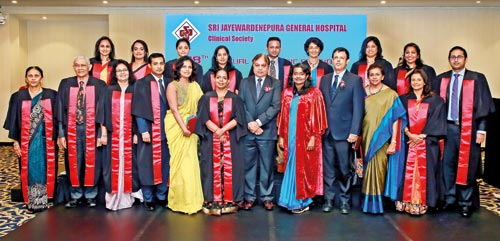News
Spotlight on immunity

The main speakers with the Council of the Clinical Society of Sri Jayewardenepura General Hospital. Prof. Malik Peiris (centre) with (to his right) Dr. Kushlani Jayatilleke, Prof. Suranjith Seneviratne and Dr. Kanthi Nanayakkara. To Prof. Peiris’s left are Dr. Sanjeevani Rupasinghe and Dr. Navoda Atapattu
Wide, varied and interesting were the topics that the 38th Annual Scientific Sessions of the Clinical Society of Sri Jayewardenepura General Hospital focused on Friday (December 15).
The ‘Healing Power of Nature: Protective Role through Immune and Metabolic Mechanisms to Promote Health’ was the theme of the sessions held under the guidance of the Clinical Society’s President and Consultant Microbiologist Dr. Kushlani Jayatilleke.
The chief guest was Prof. Malik Peiris, Chair of Virology at the School of Public Health, University of Hong Kong, Hong Kong.
Delivering the keynote address on ‘Immunotherapy: the nuts and bolts’, Prof. Suranjith Seneviratne took a look at the prevalence and incidence of immune mediated disorders and cancers which have shown a “rapid increase” in the past three decades.
“Currently, immunotherapy has become an important therapeutic option for managing a range of cancers. It has been shown to have a definite survival benefit in several ‘difficult to treat’ cancer types,” this Professor and Consultant in Clinical Immunology and Allergy based at the Institute of Immunity and Transplantation and Health Services Laboratories, London, United Kingdom, told the Sunday Times.
He said that cancer immunotherapy refers to the process of using and boosting a cancer patient’s immune system, to find and destroy his/her cancer cells.
Citing the example of the T-lymphocyte, a type of white blood cell, important in the immune system, Prof. Seneviratne said that these cells help to kill viruses, bacteria and cancer cells. Different cancer cells are able to increase the expression of special proteins that stop the T-lymphocytes from attacking cancer cells. Such proteins are called checkpoint proteins and include CTLA-4, PD-1 and PD-L1.

Dr. Kushlani Jayatilleke
He explains: “Drugs that inhibit checkpoint proteins are called checkpoint inhibitors. By blocking checkpoint proteins, these checkpoint inhibitor immunotherapy agents, make the cancer cells visible for attack by the T lymphocyte. Some currently used checkpoint inhibitor agents are – nivolumab, pembrolizumab and ipilimumab.
“Another approach would be to collect T lymphocytes from a cancer patient and modify them in the laboratory to make them express special proteins on their surface called chimeric antigen receptors (CARs). These modified cells are then infused back to the patient. The CARs are designed so as to be able to recognize and bind to proteins on the surface of cancer cells and destroy them.”
Meanwhile, in the plenary lecture on ‘Rational use of anti-rabies post-exposure prophylaxis’ by Consultant Virologist Dr. Kanthi Nanayakkara of the Medical Research Institute (MRI), she explained how rabies is a viral encephalomyelitis with 100% fatality. It is preventable with proper rabies post exposure therapy (PET).
“PET includes good wound management and a course of anti-rabies vaccine (ARV) with or without rabies immunoglobulin (RIG), depending on the severity of the exposure. Annually, around 20-30 human deaths are reported in Sri Lanka with confirmed rabies. In Sri Lanka, rabies PET, given according to a protocol based on the latest WHO advice, is offered free of charge in 296 government hospitals throughout the country,” she said.
According to Dr. Nanayakkara Sri Lanka spends around Rs. 500 million annually for rabies PET, which is more than 10% of the annual drug budget. Statistics and experience show that around 70-80% of rabies PET is used following exposure to healthy observable domestic animals which are unvaccinated or improperly vaccinated. The course of vaccination is discontinued after the Day 7 dose of ARV, if the animal remains healthy for over 2 weeks – the end of the observation period.
Deducing that 70-80% of the money spent on rabies PET has not been really necessary and this wastage could have been prevented by proper vaccination of domestic animals, she urged that with rabies being a 100% fatal infection, it would be feasible in future to consider a better, rational and cost-effective approach for rabies PET in Sri Lanka.
Consultant Paediatric Endocrinologist of the Lady Ridgeway Hospital (LRH) for Children, Dr. Navoda Atapattu, spoke on ‘An insight into Metabolic Syndrome & Type II Diabetes Mellitus in children in the Sri Lankan context’.
“The prevalence of Type 2 Diabetes Mellitus (T2DM) among children and adolescents has increased several fold in the world including in Sri Lanka parallel to the increase in the incidence of childhood obesity,” she said, pointing out that it is more common among children between 10-19 years, corresponding to the physiological insulin resistance seen at this stage.
Detailing that obesity is not the only predisposing factor for T2DM but that maternal diabetes, birth weight, post-natal rapid weight gain and type of body fat accrual after birth also contribute to the development of T2DM later in life, she said that genetic predisposition is also a crucial factor. The rapidity and degree of weight gain, physical inactivity, consumption of high calorie-food and certain diabetes-inducing medications are additive to this genetic susceptibility.
Modification of lifestyle habits and education on diet and physical activity are fundamental for all paediatric patients with T2DM, Dr. Atapattu reiterated, also referring to anti-hyperglycaemic drugs; newer glucose lowering drugs; and anti-diabetic interventions targeting gut microbiota.
The best way to say that you found the home of your dreams is by finding it on Hitad.lk. We have listings for apartments for sale or rent in Sri Lanka, no matter what locale you're looking for! Whether you live in Colombo, Galle, Kandy, Matara, Jaffna and more - we've got them all!

